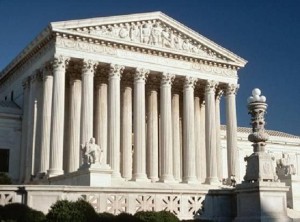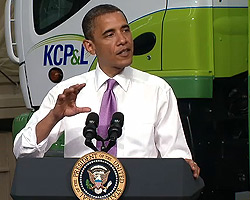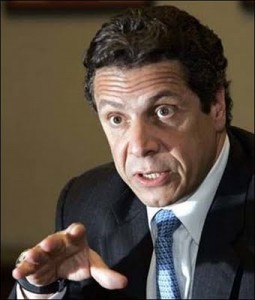 President Obama has resorted to extreme measures to forge a compromise with congressional Republicans to raise the debt ceiling and avoid a national default. He has signaled a willingness to slash federal expenditures by an unfathomable 4 trillion dollars over a decade, and he is hinting that the pillars of Social Security , Medicare, and Medicaid will not be exempt.
President Obama has resorted to extreme measures to forge a compromise with congressional Republicans to raise the debt ceiling and avoid a national default. He has signaled a willingness to slash federal expenditures by an unfathomable 4 trillion dollars over a decade, and he is hinting that the pillars of Social Security , Medicare, and Medicaid will not be exempt.
A Democratic Governor in Minnesota has taken a sharply different route, opting to shut his state’s government down unless Republicans consent to a temporary surcharge on millionaires. Meanwhile, In New York, the iconic liberal empire, a Democratic Governor has jettisoned ten thousand teachers and state employees to save money and has slashed spending for child welfare and education; at the same time, he declared tax increases off limits and fought his party’s efforts to impose New York’s own millionaire’s tax.
Welcome to the muddled place that is Democratic ideology in 2011. Under the pressures of an economy that just barely dodged a depression, and swollen entitlement obligations at both the federal and state level, chief executives who are certified progressives are living in desperate times. They are responding in dramatically contrasting ways that are partly tactical, but ultimately reveal much about the coming fissures in the Democratic Party circa 2013-2016.
At that point, Barack Obama will be one or the other: the second Democrat in a generation who saved his presidency partly by discarding liberal priorities and emphasizing a hawkish profile on deficit reduction, or a discredited figure who squandered an electric personal mandate and failed to fight hard enough for his principles. Under either scenario, a trainload of agenda items, from immigration reform to stronger collective bargaining rights and stricter regulation of carbon emissions, will have been buried.
Other anxieties, like reducing income inequality and the gender pay disparity, will be gathering dust as well. The figures who either way will be vying to succeed Obama will be pushed to decide which elements of the traditional Democratic portfolio are still worth the party’s commitment, and the budgetary decisions that preceded them will leave them precious little money to fund their promises.
Politics is never really bipolar, but I see two broad camps competing for the Democratic Party’s post Obama future. One camp emphasizes the gaping inequality in wealth and wages as the dominant progressive challenge. It favors undoing the panoply of upper income tax breaks and deductions enacted by George Bush, and left un-repealed during two years of Democratic rule. It is reflexively hostile to downsizing entitlements, or state pension obligations, and styles itself as the progressive soul of the party. While socially liberal, this “Democratic wing of the Democratic Party” is most engaged by countering, and diminishing, Wall Street’s influence in shaping public policy. Call them the “ultra Democrats”.
On the other side is a “cosmopolitan” wing of the party that includes figures like Andrew Cuomo, New York’s liberal budget-cutter and the early establishment favorite for 2016: this branch of the party is cozy with the worldview of the hedge funds and Wall Street, a vision that prioritizes growth and fiscal responsibility. While not necessarily averse to traditional working class equality issues, the “cosmopolitans” are fixated on reversing trends of stagnation and weak job growth. This camp builds its liberal bragging rights less on boosting collective bargaining and anti-poverty programs and more on an embrace of unrestricted abortion rights and gay legal equality. The “cosmopolitans” are not viscerally committed to privileging public sector unions or their orthodoxies; to the contrary, they worry that the public unions are “anti-reform” and therefore constrain individual and institutional accountability. Finally, this wing of the party accepts the premise that budgeting is a value statement, but its values include discipline and a responsiveness to bond markets. This means a healthy skepticism of a fiscal agenda that is populist and redistributionist rather than growth oriented.
The “ultra Democrats” and the cosmopolitans will invariably clash on the scope of federal regulation. The “ultras” are generally disdainful of carbon emission policies that could shackle manufacturing industries, while the “cosmopolitans” tend to view alternative energy as an economic and environmental vehicle. The “ultras” doubted TARP and argue that the re-regulation of Wall Street has not been forceful enough. The “cosmopolitans” in turn were in the room when the congressional deals were cut over derivatives and executive compensation.
Yes, there are major elements of the Democratic coalition whose views don’t gibe with the “ultras” or the “cosmopolitans”. There is still a pro-life Catholic element of the party that is decisive in battleground states like Pennsylvania and a southern African American bloc that deeply distrusts homosexual equality in the context of marriage or adoption. Then there is the Hispanic base where Obama’s approval ratings have dropped twenty points in two years–his biggest area of erosion. Latinos have the same socially conservative strains as blacks and urban ethnics and they are a conundrum for the two respective souls of the modern Democratic Party: the “ultras” are suspicious that immigration reform pits low-wage, low-skill immigrant labor against home grown construction workers in Houston and garment workers in New York. The “cosmopolitans” are squeamish in their own right and would prefer to focus the reform debate on liberalizing visas for high end engineers.
 If Democrats are unlucky, we are a Supreme Court ruling away from a 2016 election unexpectedly affected by abortion, marriage, or immigration, and the divergence in the Democratic universe over these values might rupture. But that remains unlikely in an atmosphere where regaining lost economic ground matters most. If Democrats are lucky, “winning the future”, in the president’s words, will continue to be driven for most of us by the fairness and integrity of our economy. The “ultras” and “cosmopolitans” offer two competing blueprints of just how to win that future.
If Democrats are unlucky, we are a Supreme Court ruling away from a 2016 election unexpectedly affected by abortion, marriage, or immigration, and the divergence in the Democratic universe over these values might rupture. But that remains unlikely in an atmosphere where regaining lost economic ground matters most. If Democrats are lucky, “winning the future”, in the president’s words, will continue to be driven for most of us by the fairness and integrity of our economy. The “ultras” and “cosmopolitans” offer two competing blueprints of just how to win that future.
To be sure, not every 2016 Democrat fits neatly in either the “ultra” or “cosmopolitan” strata (think Mark Warner, a social issue moderate and a deficit hawk ), and there are some whose identity is ambiguous enough to shift camps based on where an opening exists (think Martin O’Malley), but this is likely the rough alignment that will shape the liberal conversation post Barack Obama. It will be as feisty as the argument between Marco Rubio and Rand Paul Republicans.











Leave a Reply